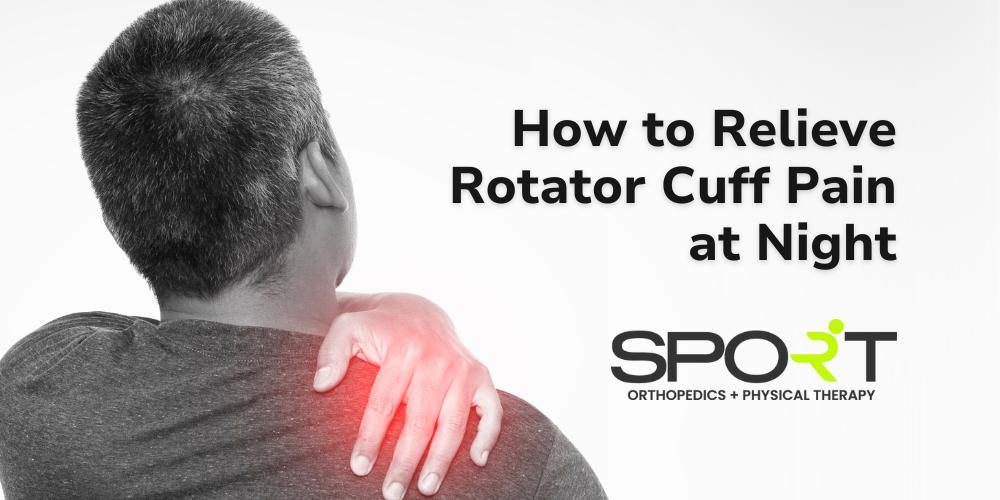Dealing with rotator cuff pain can be a significant challenge, especially when it prevents you from getting a good night’s sleep. Sleep is crucial for healing and overall well-being, but persistent shoulder pain can make a restful night seem like a distant dream. At SPORT, we can help you learn how to relieve rotator cuff pain at night with a few simple steps.
Whether you’re grappling with the aftermath of an injury, a chronic condition, or post-operative recovery, understanding how to manage a painful shoulder effectively can be pivotal for your health and quality of life. In this blog post, we’ll explore practical and effective strategies for alleviating rotator cuff pain at night, ensuring that you can rest comfortably and support your body’s healing process.
If you are suffering from a rotator cuff tear or excessive shoulder pain, you need a skilled team of professionals to help provide you with the rotator cuff repair you need. The experienced orthopedic specialists at SPORT Orthopedics + Physical Therapy are here to help ensure you are relieved of pain, day or night.
An orthopedic surgeon can help evaluate your shoulder and assess your condition to provide you with the best intervention for your pain. Call us at (469) 200-2832 to schedule an appointment with a member of our exceptional team.
What Is the Rotator Cuff?
The shoulder consists of three bones, including the upper arm bone, the clavicle, and the shoulder blade. The rotator cuff is a group of muscles and tendons that envelop the shoulder joint, which is where the arm bone connects to the shoulder blade and clavicle.
The rotator cuff consists of four muscles: the infraspinatus, teres minor, subscapularis, and supraspinatus tendon. These muscles keep the upper arm bone firmly within the joint socket while allowing the arm to move up, down, forward, and back.
What Can Cause Rotator Cuff and Shoulder Pain?
Many different shoulder conditions can cause someone to experience shoulder pain, including bone spurs, arthritis, injuries, and rotator cuff tears. Below are some of the most common causes of rotator cuff pain and general shoulder pain.
Arthritis
Osteoarthritis and rheumatoid arthritis are common types that can affect the shoulder joint. These conditions lead to a gradual deterioration of cartilage, causing pain, stiffness, and reduced mobility. While different things cause both conditions, any form of shoulder arthritis can cause a great deal of rotator cuff pain as well as inflammation and swelling.
Bone Spurs
Bone spurs, or osteophytes, are bony projections that develop along the edges of bones, commonly due to ongoing joint damage from osteoarthritis. When these spurs grow in the shoulder, they can intrude on the rotator cuff tendons, causing irritation, shoulder pain, and even a limited range of motion. This is often called “impingement syndrome” or “swimmer’s shoulder.”
Bursitis
The bursa is a fluid-filled sac that allows the rotator cuff tendons to move freely whenever you lift your arm. The bursa can become inflamed and cause bursitis, which is sometimes referred to as rotator cuff tendonitis. This inflammation can cause rotator cuff pain and decreased range of motion.
Frozen Shoulder
Frozen shoulder, also known as adhesive capsulitis, is a condition characterized by stiffness in the shoulder joint and shoulder pain. It typically develops slowly and goes through stages where pain intensifies, and the range of motion becomes increasingly more limited.
Shoulder Dislocation
A shoulder dislocation happens when the head of the upper arm bone is forced out of the shoulder socket, often due to injury or trauma. This can stretch or tear the rotator cuff muscles and tendons, resulting in immediate and severe pain, swelling, and an inability to move the injured shoulder. Dislocation can also increase the risk of developing arthritis in the joint.
Rotator Cuff Tears
Rotator cuff tears occur when the muscles in the rotator cuff either partially or fully detach from the bone. These tears can occur either due to acute injuries or chronic degeneration. Symptoms include a dull ache deep in the shoulder, arm weakness, and difficulty performing activities that involve lifting the arm.
An acute rotator cuff tear can occur as a result of trauma like a dislocated shoulder, whereas a degenerative rotator cuff tear will usually occur as a result of age or repetitive strain, like strain from weightlifting. These chronic degenerative tears develop gradually and can significantly impair shoulder function and may eventually require rotator cuff surgery to fix.
Why Does My Rotator Cuff Pain Get Worse at Night?

Many people who experience shoulder pain or rotator cuff pain report that their pain gets worse at night. While this could be due to weightlifting in your sleep, this increased pain is most likely caused by positioning, decreased blood flow, inactivity, and the body’s natural inflammatory processes.
When you sleep on your side, you put the weight of your entire upper body on the muscles and tendons in the shoulder. If you sleep on the same shoulder every night, that pressure will cause your shoulder muscles to strain and can even cause them to tear.
Even if you don’t sleep on your side, you can still experience increased shoulder pain while in bed. During sleep, your body’s circulation changes as your activity level decreases. This reduced blood flow can lead to stiffness and increased perception of pain in areas like the shoulder, especially if there’s existing inflammation or injury.
Additionally, movement throughout the day helps keep the shoulder joint lubricated and mobile. When you’re inactive, especially at night, the joint can become stiff, making any nocturnal movements or even the pressure from bedding feel more painful.
Lastly, the body’s inflammatory responses can vary in intensity over a 24-hour period, which could cause your shoulder inflammation to increase during the night, exacerbating pain in the rotator cuff.
How to Sleep With a Torn Rotator Cuff
Dealing with rotator cuff pain can be challenging, especially when it comes to getting a good night’s sleep. Pain and discomfort can disrupt sleep patterns, leading to fatigue and impacting overall recovery and quality of life. However, there are several strategies you can employ to help reduce night pain and make sleeping more comfortable.
Adjust Your Sleeping Position

If your shoulder pain wakes you up during the night, you need to find ways to minimize pain and actually allow your injured shoulder to rest. One of the most effective ways to do this is by optimizing sleeping positions. Since resting in the wrong position can aggravate the shoulder pain and disrupt your sleep, finding a comfortable posture is key to a restful night.
Best Shoulder Joint and Rotator Cuff Sleeping Positions
Several good sleep positions can help reduce nighttime rotator cuff pain and help you get a better night’s rest. If you are dealing with rotator cuff issues, you can reduce pain by sleeping on your back rather than on your side. You can even elevate your injured shoulder in this position by placing a folded towel or pillow underneath it, reducing swelling and inflammation.
If you can’t sleep on your back, you can sleep on your unaffected shoulder. For example, if your right shoulder is the one causing you pain, sleep on your left side. If sleeping on your side, however, it’s important to keep your affected shoulder from dropping forward or backward, which can cause additional strain and shoulder pain.
Sleeping in a reclined position can also help take the weight off of your shoulders when sleeping. If you don’t have an adjustable bed, you can place pillows underneath your head and shoulders or place supports under the legs of your bed nearest the headboard.
Physical Therapy for Rotator Cuff Injury
A skilled physical therapist can also help treat a rotator cuff injury. Physical therapy can help stretch and strengthen the muscles in your shoulder, promoting healing and decreasing pain. Physical therapists can not only advise you on the best sleep positions for your shoulder, but they can also provide you with pain management techniques and customized exercise programs to help you heal.
Home Treatments for Rotator Cuff

Managing a rotator cuff tear at home involves various treatments that can help relieve pain and improve shoulder function for your injured arm. Among these treatments, stretching, heat and cold therapy, and the use of pain medications are particularly effective.
Stretching
Proper stretching can be very beneficial for a torn rotator cuff. Gentle stretches can help maintain or improve range of motion, reduce stiffness, and ease pain, particularly before bedtime:
- Pendulum Stretch: Lean over slightly, allowing the affected arm to hang down in a neutral position. Gently swing the arm in small circles, clockwise and then counterclockwise.
- Towel Stretch: Hold a towel with both hands behind your back. Use your good arm to pull the affected arm upward to stretch it gently.
- Doorway Stretch: Stand in a doorway with your arms outstretched and your elbows at a 90-degree angle. Gently lean forward into the doorway until you feel a comfortable stretch in your shoulders.
Always ensure your stretches are gentle and never push into pain. Overstretching can exacerbate your injury.
Heat and Cold Therapy
Another good way to reduce swelling and pain is by using heat and/or cold therapy. A heating pad or hot pack can help reduce pain, and an ice pack or cold rag can help reduce inflammation and swelling. Using either method for 15-20 minutes before bed can help reduce pain, making it easier for you to fall asleep.
Pain Medications
Minor rotator cuff injuries can be treated with over-the-counter medications like NSAIDs, which can reduce joint pain and reduce inflammation. Always follow the dosage instructions and consult with your healthcare provider, particularly if you’re taking other medications or have underlying health issues.
Contact a Dallas Orthopedic Doctor at SPORT Orthopedics + Physical Therapy

If you are experiencing a great deal of shoulder pain and things like physical therapy and home remedies aren’t helping, it may be time to turn to an orthopedic physician. They can assess you and your condition and provide you with the best care plan for your specific needs.
Looking for rotator cuff repair in Frisco and the greater Dallas area? Look no further: we at SPORT Orthopedics + Physical Therapy are here to help provide you with the care you need. We provide the residents of Frisco and beyond with a wide variety of orthopedic surgical procedures, including those that target and treat the shoulder.
We are dedicated to providing our patients with the relief they need, so let us take this burden off your shoulders. Call (469) 200-2832 or schedule an appointment online to speak with an orthopedic specialist on our team.



